|
The
Burghley Arms
FORMERLY THE BULL INN
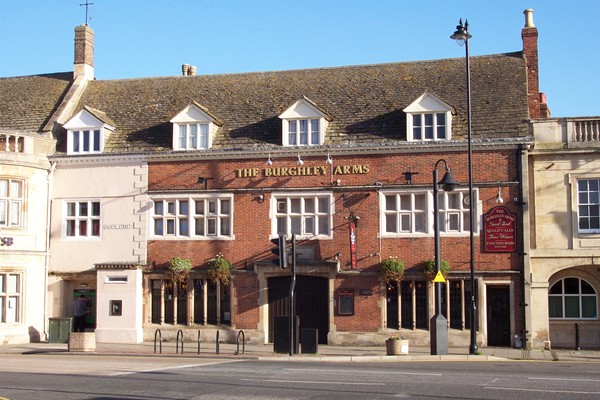
The Burghley Arms, with its four dormer windows overlooking the town centre, is traditionally regarded as the birthplace of the illustrious Elizabethan statesman William Cecil, trusted adviser to Queen Elizabeth I and the first Lord Burghley. A plaque on the front
records this association:
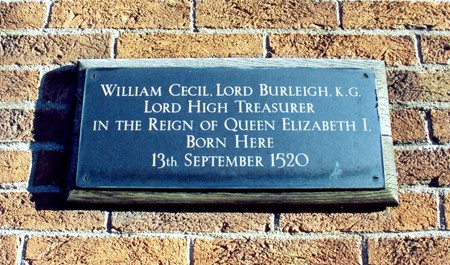
After rising to become the Queen's Chief Minister, he built himself a far grander residence, Burghley House near Stamford. Once a coaching inn, the original coaching arch has been filled in to make way for the lounge bar entrance while a particular feature that has been retained to lend a horizontal emphasis to the facade is the fine pair of stone mullioned windows on the ground floor, each with six leaded lights and the central or "king" mullions thickened to take the weight.
The building ceased to be a private residence at least as far back as 1717 but was then known as the
Bull and Talbot, then the Bull and Swan although by the 19th century is was known simply as the Bull, a sign which appears in almost every town and which stems primarily from our forefathers' love of bull baiting. The name persisted until
October 1955 when it was changed to the Burghley Arms in honour of Lord Burghley
and the plaque was erected by Bourne Urban District Council. It
also marked the end of a major refurbishment programme of the inn over a two
year period in which an oak-beamed bar area was added, a modern lounge and a
renovated Burghley Room where an illuminated scroll was hung charting the
history of the building.
The inn was a popular hostelry and also used as a meeting place for the Land Drainage Commissioners and various other local
organisations. In 1832, the Bourne New Association for Prosecuting Felons held its annual meeting here followed by a dinner. This was a voluntary body whose members came from within a twenty mile radius of the town and was devoted to the pursuit and detection of crime before a county police force was established.
The Australian novelist and poet Frederic Manning (1882-1935) also stayed here for long periods between the wars while writing his highly acclaimed novel,
Her Privates We, about life in the trenches during the Battle of the
Somme in which he named his hero Private Bourne.
|
PHOTO ALBUM |
|
 |
|
The Burghley Arms stood vacant in October 2013
when the lease ran out for the last tenant and the owners,
Enterprise Inns plc, tried to find a new landlord. Within days, the
building began to take on a neglected air with flowers in the
hanging baskets withered while plastic signs adorned the walls,
notably a notice advertising for a new owner under the slogan “This
pub – could you run it?” together with a contact telephone number,
an indication of the parlous state of the licensed trade today. |
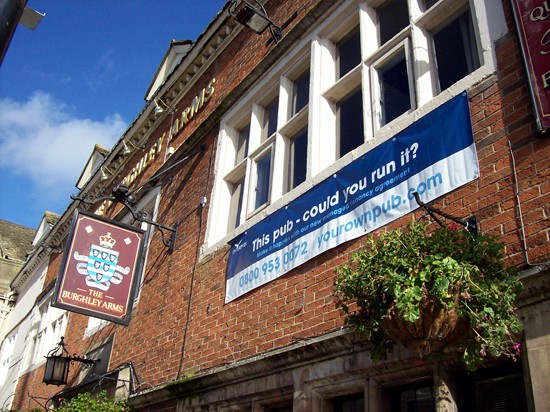 |
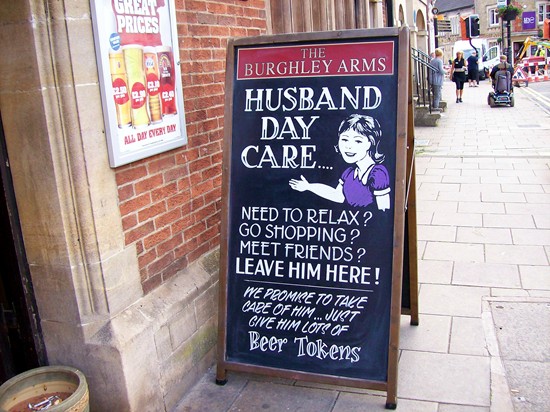 |
|
Pub landlords are always ready to attract new custom and a novel
idea adopted by the Burghley Arms in the summer of 2015 was to run a
husband day care service while their wives are out shopping with the
advice that he should be left with plenty of beer tokens. |
|
THE BURGHLEY ARMS IN PAST TIMES |
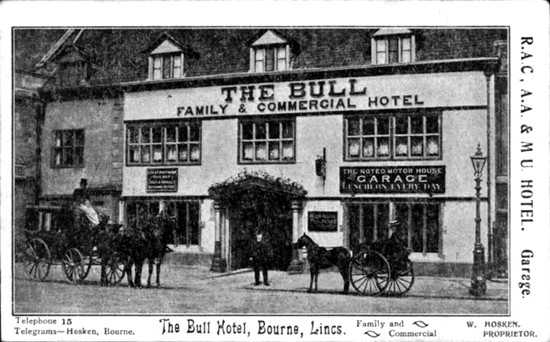 |
|
A trade card from circa 1912 published by the
landlord, Walter Hosken, who was also a carting agent for the
Great Northern Railway Company. The
photographs below of a less crowded market place were taken around 1920,
probably by
the Bourne photographer William Redshaw whose business name plate was
among those displayed on the inn wall. |
|
 |
|
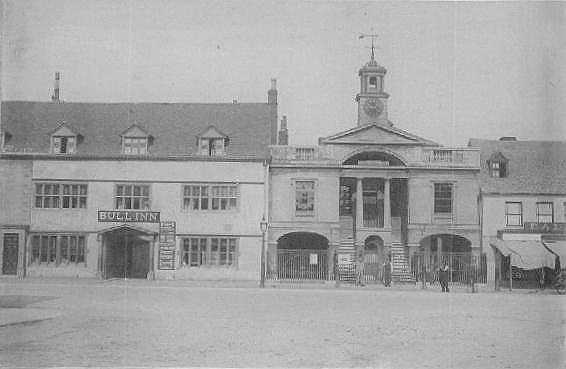 |
|
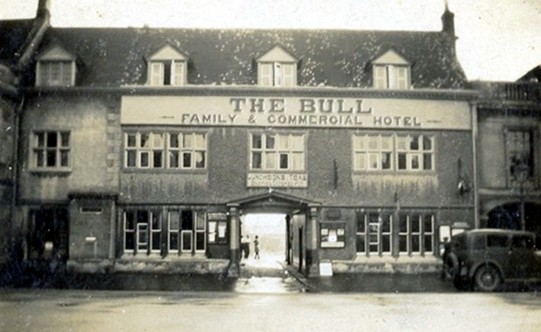 |
|
The coaching archway leading to the
stables at the rear was blocked in to provide a front entrance
during the middle years of the 20th century and is seen in the
pictures below circa 1930 as a meeting place for the young men of the
town, waiting perhaps for the inn to open. |
|
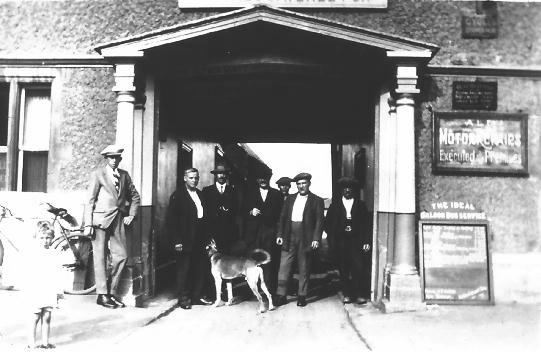 |
|
FROM THE ARCHIVES |
|
BULL INN, BOURNE
WILLIAM LAYTON, in retiring from the above Inn, most respectfully
acknowledges the favours conferred upon him, and begs to introduce
as his successor, Mr W Mullett, who he can confidently recommend to
their patronage.
WILLIAM MULLETT, on entering upon the above Inn, begs to assure the
nobility, gentry, commercial gentlemen, and the public generally,
that every effort on his part shall be used to render the above
Establishment deserving their support. - public notices from the
Stamford Mercury, 1st October 1841. BULL
INN, BOURNE
W Mullett respectfully announces to his fiends that his OPENING
DINNER will be on Wednesday the 5th January next; on which occasion
he will be happy to see those gentlemen who can make it convenient
to honour him with their company. N B: An early application for
tickets will be deemed a favour. - public notice from the
Stamford Mercury, Friday 12th December 1841.
Yesterday morning, between the hours of one and four, the Bull
Inn at Bourne was burglariously broken into and the following
articles were stolen, viz., one dozen silver tea spoons, half a
dozen silver dessert spoons, six silver forks and a japanned spice
box. A reward of 15 guineas is offered by Mr Mullett and 5 guineas
by the Bourne Association [for the Prosecution of Felons] for
discovery of the offenders. - news report from the Stamford
Mercury, Friday 28th October 1842.
The American wizard. Mr Lewis, performed in the large room at the
Bull Inn, Bourne, on Wednesday last and his performance was said to
be "truly astonishing". - news item from the Stamford Mercury,
Friday 16th April 1847.
On Tuesday last, the front of the Bull Inn, Bourne, presented a
novelty - two carriages changing horses at the same time, to the
satisfaction of mine host and the post boys. One was that of the
Honourable Member for South Lincolnshire, Sir John Trollope, who was
on his return from Lincoln Assizes. - news item from the Stamford
Mercury, Friday 21st July 1847.
BULL COMMERCIAL INN and POSTING HOUSE
EDWARD ELDRET, having succeeded Mr Mullett, respectfully informs the
nobility, gentry, clergy, commercial gentlemen, and others who may
honour him with their patronage, that he is fitting up the above inn
with the object of insuring his friends every possible comfort and
that no exertion on his part shall be wanting to deserve their
favours. Commercial gentlemen will meet with every accommodation. An
entire new stock of wines and spirits of the rarest quality has been
laid down. Strict attention shall be paid to the stables; and for
the posting department he has purchased good and steady horses with
which will be sent careful drivers. - public notice from the
Stamford Mercury, Friday 6th April 1849. |
REVISED JUNE 2015
See also
William Cecil
Frederic Manning
The story of Joseph Brightmore

Go to:
Main Index Villages
Index
|









